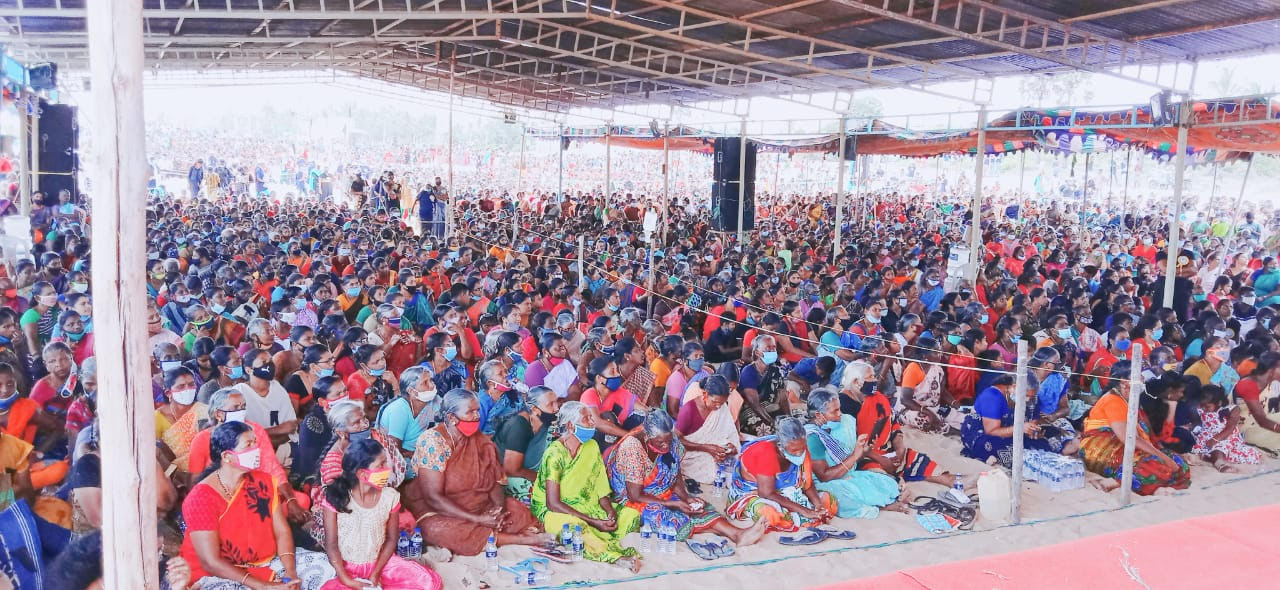
Ashok Dhawale
THE Samyukta Kisan Morcha’s (SKM) call for a Bharat Bandh on March 26, the day the farmers’ struggle completed four months, and for burning the three hated farm laws on the day of Holi, March 28, received enthusiastic response all across the country.
The Bharat Bandh call had been given for the following five demands: Repeal the three farm laws; make law on MSP and procurement; cancel all police cases against farmers; roll back the electricity bill and the pollution bill; and reduce prices of petrol, diesel and gas.
The Bharat Bandh got a large response in states like Punjab, Haryana, Uttar Pradesh, Uttarakhand, Himachal Pradesh, Rajasthan, Madhya Pradesh, Chhatisgarh, Bihar, Jharkhand, Odisha, Maharashtra, Telangana, Andhra Pradesh, Karnataka and elsewhere. The four main election-going states of Assam, West Bengal, Kerala and Tamil Nadu and also Puducherry had been exempted from the bandh.
Markets, mandis and shops in several cities and towns in most of the above states were closed down for the day. Hundreds of national and state highways were closed down for several hours. Tens of thousands of farmers and workers, along with women, youth and students were on the roads appealing to the people to participate in the bandh, which they did. Anger against the adamant and insensitive BJP regime was palpable everywhere.
Several opposition political parties, central trade unions, agricultural workers’ organisations, traders and transporters associations, women, youth and student organisations not only extended full support to the bandh, but many of their activists came on to the roads.
In BJP-ruled states like Uttar Pradesh, Gujarat, Karnataka and others, several activists of farmers’ organisations affiliated to the SKM were arrested. Following the notoriously repressive laws made earlier by the Uttar Pradesh government, recently the BJP-ruled states of Haryana and Bihar have also enacted the most draconian laws to stamp down on all kinds of dissent.
To mark the Holi festival on March 28, at all the Delhi borders and throughout the country, tens of thousands of farmers made bonfires of all the three black farm laws, and along with them, also the four black labour codes and the electricity and pollution bills. Trade unions and other organisations whole-heartedly supported the farmers’ organisations in these actions.
On March 23, to mark the martyrdom anniversary of Shaheed Bhagat Singh, Rajguru and Sukhdev, both at the Delhi borders and throughout the country, students and youth participated in tens of thousands to take forward the patriotic and revolutionary legacy of Bhagat Singh and his comrades, and to support the farmers’ struggle. As given in last week’s columns, the AIKS, CITU and AIAWU held three impressive padayatras of hundreds that began on March 18/19 and culminated at the Singhu, Tikri and Palwal borders on March 23.
Meanwhile, massive mahapanchayats of tens of thousands of peasants are constantly being held in different parts of the country. These are immensely helping to raise the consciousness of the peasantry against the neoliberal, pro-corporate, undemocratic, communal and fascistic policies of the BJP-RSS-led governments at the centre and in the states. In the election-going states also, the role of the BJP government vis-a-vis the farmers’ struggle is being condemned.
Concentrating on the danger to food security, MSP and government procurement because of the three farm laws, the SKM has now given a call to gherao offices of the Food Corporation of India (FCI) on April 5. For the last several years, the budget of the FCI has been slashed by the central government. Recently the FCI also changed the rules for the procurement system of crops. The SKM has said that this is a grave problem for both food growers as well as food eaters, i.e., for the people of India as a whole.


